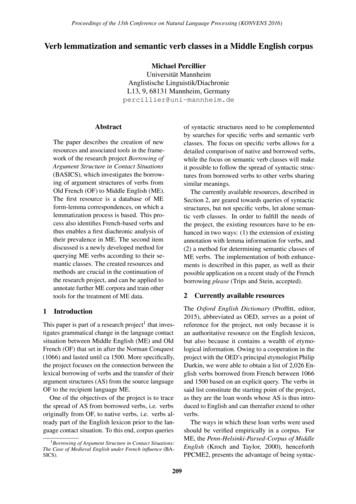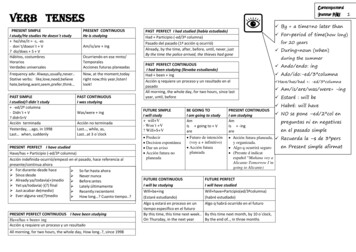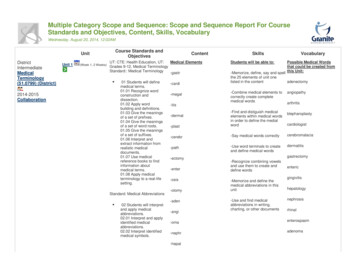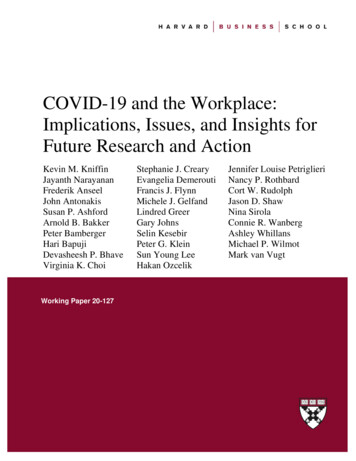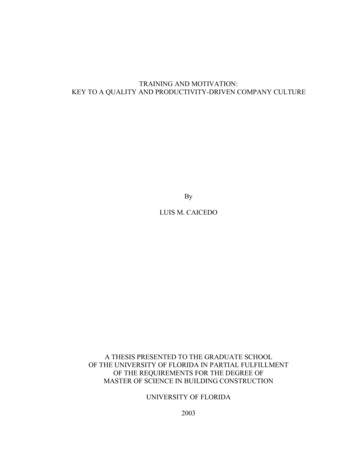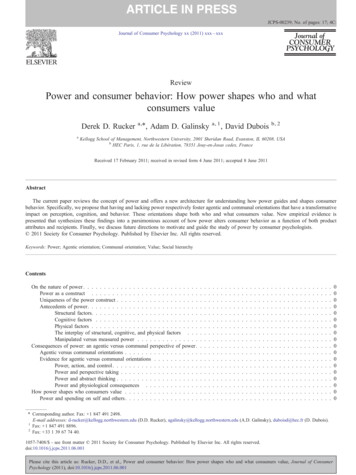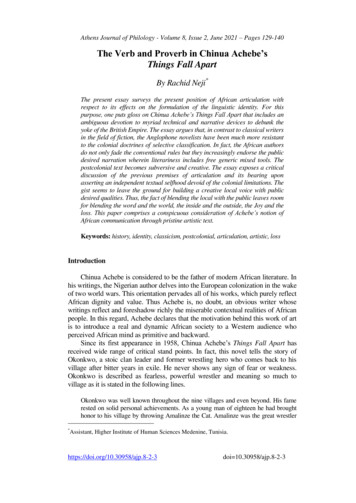
Transcription
Athens Journal of Philology - Volume 8, Issue 2, June 2021 – Pages 129-140The Verb and Proverb in Chinua Achebe’sThings Fall ApartBy Rachid Neji*The present essay surveys the present position of African articulation withrespect to its effects on the formulation of the linguistic identity. For thispurpose, one puts gloss on Chinua Achebe’s Things Fall Apart that includes anambiguous devotion to myriad technical and narrative devices to debunk theyoke of the British Empire. The essay argues that, in contrast to classical writersin the field of fiction, the Anglophone novelists have been much more resistantto the colonial doctrines of selective classification. In fact, the African authorsdo not only fade the conventional rules but they increasingly endorse the publicdesired narration wherein literariness includes free generic mixed tools. Thepostcolonial text becomes subversive and creative. The essay exposes a criticaldiscussion of the previous premises of articulation and its bearing uponasserting an independent textual selfhood devoid of the colonial limitations. Thegist seems to leave the ground for building a creative local voice with publicdesired qualities. Thus, the fact of blending the local with the public leaves roomfor blending the word and the world, the inside and the outside, the Joy and theloss. This paper comprises a conspicuous consideration of Achebe’s notion ofAfrican communication through pristine artistic text.Keywords: history, identity, classicism, postcolonial, articulation, artistic, lossIntroductionChinua Achebe is considered to be the father of modern African literature. Inhis writings, the Nigerian author delves into the European colonization in the wakeof two world wars. This orientation pervades all of his works, which purely reflectAfrican dignity and value. Thus Achebe is, no doubt, an obvious writer whosewritings reflect and foreshadow richly the miserable contextual realities of Africanpeople. In this regard, Achebe declares that the motivation behind this work of artis to introduce a real and dynamic African society to a Western audience whoperceived African mind as primitive and backward.Since its first appearance in 1958, Chinua Achebe’s Things Fall Apart hasreceived wide range of critical stand points. In fact, this novel tells the story ofOkonkwo, a stoic clan leader and former wrestling hero who comes back to hisvillage after bitter years in exile. He never shows any sign of fear or weakness.Okonkwo is described as fearless, powerful wrestler and meaning so much tovillage as it is stated in the following lines.Okonkwo was well known throughout the nine villages and even beyond. His famerested on solid personal achievements. As a young man of eighteen he had broughthonor to his village by throwing Amalinze the Cat. Amalinze was the great wrestler*Assistant, Higher Institute of Human Sciences Medenine, Tunisia.https://doi.org/10.30958/ajp.8-2-3doi 10.30958/ajp.8-2-3
Vol. 8, No. 2Neji: The Verb and Proverb in Chinua Achebe’s who for seven years was unbeaten, from Umuofia to Mbaino. Okonkwo was clearlycut out for great things. Although Okonkwo was still young, he was already one ofthe greatest men of his time. Age was respected among his people, but achievementwas revered (Achebe 1996, pp. 3, 8).In the novel, Okonkwo does many actions in order to prove that he is a "realman" and able to achieve the dreams of his tribe. He always pretends to be strongand powerful. However, it appears that this pomposity will guide him to a possibledownfall. In this sense, the novel delineates the Igbo people at a truly importantstage in their history and culture. In fact, colonial forces apply pressure and lookfor power. The colonial forces basically proclaim the end of African traditionalconsciousness ranging from religion, family unit and gender relations. Colonialvoices do not come to control the uncontrolled, rather they long for preaching anew conceptualization that ends with the patriarchal knowledge. In this regard, theauthor attempts to portray the postcolonial African reality in all its varied versionsand to find out the extent to which this work of fiction reflects the aspirations ofthe African community.Since the novel belongs to the Anglophone tradition, the work combines asort of narration, proverbs; old values which are brought to lay bare the Westernnew belief and orientation. The African traditional songs convey the traditionalfolklore and provide a suitable realm to highlight the dominant features of thenovelist’s anti-colonial discourse as well as system. Such a process can beunderstood as the result of Achebe’s fashioning of a private linguistic identitycapable of representing the African pristine universe and better to boycott thesearch of a selfhood in the pre-colonial area. Giving the important value ofAchebe’s literary work, the present study endeavors to explain the linkagebetween the linguistic discourse and African selfhood. The main interest is toorchestrate a background of knowledge able to subvert the colonial ideologies andassert a proper African realm based on the freedom of consciousness and belief.Theoretical AssumptionMany contemporary critics have dealt with postcolonial studies among themis Mikhail Bakhtin who treats the colonial and postcolonial discourse from adialogic approach. To this exception, the effect of "situating the work of MikhailBakhtin in relation to contemporary literary, theoretical, and philosophicaldiscourse is in no way a straightforward proposition" (Miller et al. 2001). This isdue to his emphasis on the necessity of giving voice to marginalized texts andtaking them as leading insights in the development of narrative multiplicity. Thescheme emphasizes the importance of avoiding single interpretation and uniquetheoretical perspective while approaching colonial context. He asserts that a criticshould thoroughly investigate a various number of cultural dialectics andorientations.For Bakhtin, language turns out to be an obvious tool depicting the greaterinterrelated body of postmodern discourse. The discursive power interactionappears to be responsible of devising meaning, identity and reality on different130
Athens Journal of PhilologyJune 2021levels. In other words, Bakhtin focuses on the foregrounding the colonizedlanguage against the background of past categorization produced by the colonizerin the colonial era. Thus, he puts gloss on the discourse of post-colonialism andthe stylistic features to highlight the hidden space of meaning.To put it another way, such a space of linguistic expression is the outcome ofmultiple structures. This process produces complex signs or symbols which arenecessary to decode new avenue of thoughts. This intention by the postcolonialcritic is in affinity with Derrida’s theory of difference. To reinforce this vicinity, itJacques Derrida suggests that, "it is because of difference that the movement ofsignification is possible" (qtd. in Bass and Différance 1982, p. 13). The assumptionis based on the fact that the postmodern fragmentation affects the structuralcomponents which ultimately lead to the denial of objectivity in that culture andidentity. In Bakhtin’s point of view, in order to study a postcolonial subject, thecritic should pay attention to hybrid identities within the space of discourse.Moreover, he should recognize how through the technique of differentiation adependent subject is to be freed from the yoke of the colonizer.In this sense, Bakhtin’s reading of postcolonial discourse puts the finger ontwo particular purposes. The first one is to assert otherness and give voice to thecolonized subject. The second aim lies in transcending the discourse of colonialpower towards establishing a resistant identity, polyphonic and carnivalesticdiscourse. Dentith (1993) deems that this situation cannot be reached unless hasbeen "a plurality of independent and unmerged voices and consciousnesses, agenuine polyphony of fully valid voices" (Dentith 1993, p. 7). The main motivationresides in establishing a rhetoric realm wherein the marginalized subject voicesand confirms his linguistic existence to a public audience.Actually, the postcolonial discourse seeks to debunk grand narratives andbypass the power of ideology. So, in applying his conception, the postcolonialwriter belittles the authority of ideology in the construction of meaning at differentlevels. Similarly, Bakhtin advocates social dialogues and active voices, which areable to record and narrate independent discourses. In fact, Polyphonic text shouldreflect reality through linguistic features. In this sense, an ideal novel comprises adialogic interaction between the supposed authorial voice and those belonging tothe margin. Therefore, discursive authenticity is related to this linguistic as well asmeaningful intrusion.In addition, Bakhtin puts the stress on the power of carnivalesque as well ascelebration. This narrative technique combines the past with the present, thecolonial with the postcolonial, and the sacred with the profane in order to establisha discursive area of differentiation and acceptance. A "polyphonic novel" thatunites the differences deserves to host new dialogism based on juxtaposition,negotiation and authenticity (Bakhtin1984, p. 39). This conceptualization clarifiesBakhtin’s understanding of the narrative reality. In this sense, one can deliver thatin Bakhtin’s point of view truth is not singular, linear and universal.However, reality and certitude should reflect the variety of voices in society. Thus,the critic seeks to fashion an open text wherein the public interferes with theparticular, the dominant negotiates with the margin, and the context interacts withthe text.131
Vol. 8, No. 2Neji: The Verb and Proverb in Chinua Achebe’s As stated earlier what is of paramount importance is to make sense of thecircumstances under which the novelist has managed to write an alternativediscourse in order to haunt the discursive dominance and to ironize the Britishatrocity in his Things Fall Apart. Plainly, putting this literary work in center andreading it based on the philosophy of Bakhtin, the major tenor of the present studyis to expand the territorial perception about the author and how he has framed hisinnovation in his narrative texture.DiscussionA new discourse cannot possess an aura without prioritizing the linguistic andgrammatical features of the language in which it is introduced. In this sense,language plays an important role in the construction of a national literature and thedeconstruction of colonial shackles. That is why, in the 1950s and 1960s when theAfrican marches for emancipation were reaching their peak, the dilemma ofweaving a proper African language gained full concentration in order to opposethe dominant colonial hegemony.What is really needed appears to be a language that is capable of expressingthe oral and written African literature. Achebe’s main target is to elucidate throughhis literary works the urgent need to construct an African discourse with a capacityto bring insight both to non-African readers, writers and critics. This orientationpaves the way for debunking colonial signs and establishing an African localwritten narration. Plainly, a postmodern African voice that is fertile with keyconcepts such as transcendence, emancipation, metamorphosis and subversion.Notably, Achebe’s achieves a sort of success in the creation of a properAfrican language. This is due to his wide dealing with the Nigerian traditions. Heis conscious of the clash between the pre-colonial traditions and the postmodern.The very consciousness arouses the necessity to create an African voice freed ofthe whiteness and blackness ideologies. The author seeks to promote a discourseof otherness promoted by the white new colonizers and the oral African literature.Achebe wants to inculcate the idea that the Nigerian literary writers should benefitfrom their past and find luminous insights in spite of all its imperfections. Thismovement paves the ground for devising an alternative discourse based on aproper African linguistic background.In Things Fall Apart, Achebe’s specificity lies in his choice of the Englishlanguage to portray the dark side of the colonizers. This intention is caused by thelinguistic power of this language and its ability to welcome the African discursiveproduction and the British narrative features. The novelist incorporates the Africanoral images to the English language as a unifying discursive tool. The author doesnot long for putting an end to the oral literary potential of African storytellers.However, Achebe wants to make these stories available in a written linguisticcorpse. Thus, one can assert that Achebe’s choice for writing African traditionswhile using English language is a sort of linguistic and postcolonial awareness.The author’s discourse adopts a language that catches the attention of myriad132
Athens Journal of PhilologyJune 2021readers. This language makes reference to African dialects and proverbs in orderto satirize and ironize the colonial history and literature.The specific point in Achebe’s strategy lies in reproducing attributes ofAfrican oral tradition into an official anti-colonial discourse. As a matter of fact,Achebe uses the colonial language as a discursive weapon to fight the narrativehegemony of the white authorial voice. His emphasis on using English clarifies hisdeep critical attitude towards the narratives of colonial writers. Achebe’s reappropriates the beauty of African dialects in a colonial language to lay bare theatrocity and hypocrisy of the new comers. Then, the linguistic recurrence becomesa sort of deconstruction and construction of a new postcolonial future.The first characteristic in the case of Chinua Achebe’s language is that thediscursive features of the novel derive from the Igbo proverbs. These stories areartistically used through an act of literal translation and without deviating from theEnglish language. As a matter of fact, this artistic contemplation seems to be thegist of vocabulary selectiveness. The author transforms the strange word andsyntax into meaningful structures. The very transformation of the linguisticproperties appears to be appreciated by the non-Igbo English critics providing thatit constitutes a fundamental background of cultural linkage between colloquialdialect and standard language. These African proverbs are re-appropriated toenlighten the linguistic and cultural realities of Igbo people.In the novel, one can find "a toad does not run in the daytime for nothing"(Achebe 1996, p. 15) and "a child fingers are not scalded by e piece of hot yamwhich its mother puts into its palm". In fact, proverbs are manifestation of Africannarrative civilization. This oral literature is resurrected to situate Achebe’sdiscourse within the context of postcolonial literature written in standard language.For instance, Fanon (1993) sustains that, "there was nothing to be ashamed of inthe past, but rather dignity, glory and solemnity. The claim to a national culture inthe past does not only rehabilitate that nation and serve as a justification for thehope of a future national culture" (Fanon 1993, p. 169). This optimistic attitude isshared by Achebe who uncovers the splendid past of Nigeria through rememberingthe pre- colonial Igbo culture.Achebe’s recurrence of the African mythological stories and strange words isa manifestation as well as revitalization of the African lost culture. The authorwants to infuse life into the African history after the hegemonic presence of thecolonizers language. The writer endeavors to search for the literariness in the Igbonative tongue in order to expose it and show its power as a weapon to fight thepower of the colonizers. Stories, folktales and myths identify African peculiarityand append to the path of independence.It is evident that Achebe centralizes the Igbo proverbs to reveal its discursivepower. The African dialect is used as rhetorical device to insist on its linguisticcharm for the universal readers. For instance, Okonkwo’s father’s speech to Okoye"Among the Igbo the art of conversation is regarded very highly and proverbsare the palm-oil with which words are eaten". (Trilogy 7) suggests the fact thatAchebe seems to be proud of the African historical memory. Clearly, the author’smain target is to unite these historical fragments into a linguistic and originalorganic unit.133
Vol. 8, No. 2Neji: The Verb and Proverb in Chinua Achebe’s In addition, the author incorporates folklore stories as discursive devices topreach a new discourse of the colonized African people. According to Achebe,stories are the backbone of African society. These stories are linguisticallymodified in order to introduce the African language to European readers. Thisscheme stands for the only shelter to protect the past from the dominant discourseof the colonizer. In fact, the author re-invigorates the African tales and the Igbostories and he endeavors to expose them through using a simple narrative style.The very simplicity is meant to highlight forgettable storytelling techniques.Moreover, one can confirm that Achebe’s resurrection of African stories playsa fundamental role in weaving the discursive and thematic functions of the novel.These tales explain the artistic craft of the African authors while introducing thetrauma of colonization. For instance, the story of Snake-Lizard in the ninth chaptershows the writer’s insistence on providing language with a literary aura. Achebeseeks to persuade the reader of the colonizer’s danger towards the natives.Similarly, the above story narrates Okonkwo’s wife food. She cooks and tellsstories to her daughter. Indeed, the mother prepares food and tells a specific story.What can be deduced from this movement is that for African people food cannothide the colonial danger. What the African people want is dignity and justicewithin their filched land.The author emphasizes the fact that African people cannot forget their pastmemories. This history is saved inside the mother’s heart and father’s mind.Forgetting and forgiveness seem to be a sort of imagination. Forgetting leads to theloss of punishment and resurrection. Forgiveness leaves no room for celebration.That’s why, the mother narrates and Achebe writes her stories to the world inorder to insist on the positive presence of historical events. This narrative collusionis only meant to ironize the present colonial hypocrisy. Thus, language appears tobe the main bridge for humorous and harmonious linguistic, political and historicalconstructions.Things Fall Apart appears to be a response to earlier colonial period ofAfrican land. For this reason, Achebe’s choice of language is functional as well aspolitical. While some later African authors voice the native African languages as aform of resistance to colonialism, Achebe wants to achieve cultural revitalizationthrough the use of the colonial signifier. His ability to ape the rhythm of the Igbolanguage assists him in using Igbo proverbs, folktales and vocabulary in the novel.In fact, Igbo proverbs are entirely native and they comprise native wisdom. Inaddition, Folktales are important components of the Nigerian oral tradition. Then,this re-appropriation makes the African tradition and Igbo liberation go throughthe process of oral and linguistic identification.Furthermore, in order to expose the misery of Igbo tribe, Achebe foregroundsthe African diction. In fact, the author inserts a series of Igbo words into theEnglish text. This linguistic strategy is used to introduce the cultural, religious andsocial specifications of Umuofia people. These devices are inserted by the authorto build a rhetoric area on the basis of a foreign language. The postcolonial writerseeks to localize the African dialect, history and story within a standard linguisticsystem. For example, in chapter seven, Okonkwo introduces the following Africansong:134
Athens Journal of PhilologyJune 2021SalaEze ilikwa ya Ikwaba akwa ogholiEbe Danda nechi eze Ebe Uzuzu nete egwu Sala (Achebe 1996, p. 60).In fact, the writer seizes the opportunity to represent the tradition of Igbo life.This presentation is done through the use of a worldwide language in order toseduce the universal readers. The postcolonial author is no longer dead or lost inthe myriad narrative voices. However, Achebe lives with the dream to subvert thecolonial power and assert the beauty of African people. This dream comes toreality through a colonial linguistic power and the craft of colonized other. Then,otherness is no longer a passive subject and submissive ego. It becomes sign ofstrength and hegemony.Obviously, it can be asserted that the African author has attempted to constructa discursive universe able to induce and expose the positive aspects of homogenousdiscourse. Achebe’s target is to provide an alternative narrative constructioncapable of demolishing the colonial text. The writer’s reference to past storiesconstitutes the backbone of a post-colonial construction alongside with itsoptimistic repercussions which foreshadow for an independent Nigerian nationalliterature.Another postmodern philosophical technique dominates Achebe’s novel. Thedevice stresses the death of the author and the multiplicity of voices. It shows therichness of postcolonial discourse and its compactness. In fact, the techniquesurges from Bakhtin’s philosophy of multiple voices within the text. In this sense,Okonkwo’s voice appears to be dominant in Things Fall Apart. This vocaldominance cannot hide the appearance of other related minor voices. Thisinteraction appears to be specific and original within postcolonial discourse. Itmeans that concepts such as authorship and centrality disappear. What comes nextcan be explained into Bakhtin’s theory of Polyphony.In this regard, the multiplicity of voices generates the presence of an absentvoice and the appearance of a disappeared history. Achebe seeks to pave the wayfor polyphonic discourse wherein opposing events can conflate and promote inspite of the hidden difference. For the author, the deconstruction of colonizationmust be followed by myriad steps of tolerance and equality. This process conveysa mirage and sort of sublimation. However, the acceptance of otherness, theovercoming of colonial shackles and the submissiveness to recent metamorphismis sufficient to achieve positive vibes within a universe of turmoil as well asanarchy.Going beyond the surface level and taking into consideration the narrativevoice, one can deliver that Achebe’s deconstruction of authorship is mainly meantto stigmatize the classical patriarchal system. In fact, the concept of patriarchystresses the superiority of masculinity over femininity. In Things Fall Apart,Okonkwo deeply believes in this conceptualization. He goes on to show his powerand strength as a leader to Umuofia tribe. The intention of leadership leads him toneglect the history of his father "Unoka". This hatedrness can be related to thewriter’s wish to end with patriarchal society. This historical divorce includes thesubversion of the colonial leadership and the construction of an African land witha specific history, language as well as identity. The construction will undo with135
Vol. 8, No. 2Neji: The Verb and Proverb in Chinua Achebe’s traditional notions of inferiority and otherness. It will pay lip service to a body ofsocial and linguistic discourse wherein language and society are intertwined. Forinstance, Achebe’s creation is expressed by the following declaration in ThingsFall Apart"It’s true that a child belongs to its father. But when a father beats his child, it seekssympathy in its mother’s hut. A man belongs to his fatherland when things are goodand life is sweet. But when there is sorrow and bitterness he finds refuge in hismotherland. Your mother is there to protect you. She is buried there. And that is whywe say that mother is supreme" (Achebe 1996, p. 124).Such a confirmation may be seen as the reason beyond the novelist’s tendencyto defend and constitute a social, historical and linguistic dialogue with thecolonial system to protect his motherland and foreground the mother tongue. Itshould be highlighted that the negotiation with the ‘white man’ brings aboutdouble optimistic results. The first one lies in laying bare the hypocritical aspect ofthe supposed colonial civilization. The second delivers that the pre-colonial areawas a period free of bias or presumptions.One can deduce that Achebe’s novel is a palpable demonstration of "collapse,breaking into pieces, chaos, and confusion" (Alimi 2012, p. 121). In fact, thedifference between Achebe’s novel and other colonial novels is that his bookthoroughly describes Igbo society as he introduces them in a manner whichexposes all aspects of Igbo universe and not only the optimistic aspect of theirculture. He also looks for building a linkage between Igbo society and the whitemissionaries to take control of Umuofia.The Igbo depend on their language to differentiate their quality from the whitecolonizers. They also use ambiguous language to define their presence in thepostmodern society. The linkage between language on the one hand and culture onthe other can only explain the virginity of pre-colonial era and the atrocity ofcolonial action. This is because verbs and proverbs complete each other andsucceed in defining the gist of dilemma. Neither language nor culture can lay barethe colonial reality without the craft and artistic orientation of the author. Hence,Achebe’s treatment and description of African people can obviously beappreciated in the way he linguistically represents their experiences, stories andrealities. In most instances, one can confirm that the essence of African resistancecan be measured by the power of history and the visibility of language.To expose the native moral values, Achebe recurs to the use of the coloniallanguage. In this sense, The English language plays the role of introducing Igbo’straditions. Achebe feels that language is a linguistic power responsible forironizing the colonial hypocrisy and empowering the colonized weakness. It willbe able to narrate the unsaid and put light on the dark side of the Africanexperience. The author’s dealing with language generates a postmodern treatmentthat puts an end to conventional ideologies and pays lip service to postcoloniallinguistic Africanization. Achebe will not use English to hide the reality of thecolonizer. However, language is used to reflect the deprivation and beauty ofAfrican surroundings.136
Athens Journal of PhilologyJune 2021Devices like metaphors and similes are used to highlight the traumaticconditions of Igbo society. Hyperbole, which is a significant tool in Africantradition, is also foregrounded. The use of these technical features providesAchebe’s text with a typical linguistic status. For instance, the following hyperbole:"a bowl of pounded yam can throw him in a wrestling match" (Achebe 1996, p.47) signifies the linguistic peculiarity of African text as well as context. It is a textrich with codes which reflect the technical and unfamiliar discursive behavior.Some metaphors include: "Amalinze the cat" (Achebe 1996, p. 8), and "python thesky" (Achebe 1996, p. 118). In this sense, these devices are incorporated to clearlydelineate the life of Igbo in a subversive manner so as to criticize the colonialtyrannical events. To put it briefly, by resorting to the appropriated Englishlanguage, Achebe wants entirely to present the picture of the pre-colonial Igbosociety in a transparent and obvious way. Then, Achebe’s verisimilitude boosts hiscritical, deconstructive and constructive intention.Furthermore, Achebe’s ironic discourse is conspicuous in the novel. It isplausible through the actions of the two missionaries. For example, the white manseeks to spread his own culture within the African culture and Mr. Brown yearnsto the same devise conflict among the Ibo people. In fact, whiteness: "is veryclever. He came quietly and peaceably with his religion. We were amused at hisfoolishness and allowed him to stay. Now he has won our brothers, and our clancan no longer act like one. He has put a knife on the things that held us togetherand we have fallen apart" (Achebe 1996, p. 152). The tenor is that both of themhide a particular target. Mr. Brown’s softness is meant to seduce and convertpeople to Christianity. Mr. Smith’s tyrannical attitude serves the same goal whichis the destruction of the Nigerian tribe. Thus, Achebe exemplifies them to satirizethe colonial power and show its destructive purpose.With the use of the English native language, the author delineates the life ofIgbo society. In the beginning of the novel, African stories and dialects narrate andexpose all the nine villages of Umuofia. However, as the novel develops and whitemissionaries begin arriving in Umuofia along with their government and aninstitution, Achebe tries to insert the colonial language so as to introduce theAfrican trauma and protest the pompous presence of whiteness. For instance,Owomoyela (1993) further asserts that:"Achebe presents a thorough understanding of narrative organisation and style, and akeen observation of and absorption with day-to-day happenings, not through thelenses of the anthropologist, but through the clear insight of one who was involvedwith and felt at one with his culture while at the same time inculcating western ideas"(Owomoyela 1993, p. 18).Following this, Achebe appears to be able to fully convince and seduce theuniversal audience of the colonial pessimistic actions. However, the author’s mainpurpose seems to hint the idea that verbs and proverbs are considered to be thebackbone of any cultural, social or literary emancipation. Achebe employs his artto evoke the tormented aspect of human existence. Throughout the novel, theshadow of death looms a
people. In this regard, Achebe declares that the motivation behind this work of art is to introduce a real and dynamic African society to a Western audience who perceived African mind as primitive and backward. Since its first appearance in 1958, Chinua Achebe’s Things Fall Apart
